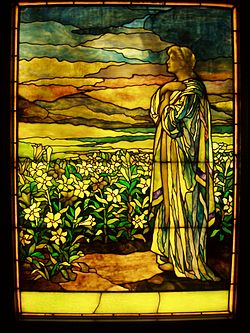- Matthew 6:28
-
Field of Lilies - Tiffany Studios, c. 1910.

Matthew 6:28 is the twenty-eight verse of the sixth chapter of the Gospel of Matthew in the New Testament and is part of the Sermon on the Mount. This verse continues the discussion of worry about material provisions.
In the King James Version of the Bible the text reads:
- And why take ye thought for raiment?
- Consider the lilies of the field, how they grow;
- they toil not, neither do they spin:
The World English Bible translates the passage as:
- Why are you anxious about clothing?
- Consider the lilies of the field, how they grow.
- They don’t toil, neither do they spin,
For a collection of other versions see BibRef Matthew 6:28
Two verses earlier at Matthew 6:26 Jesus told his followers not to worry about food, because even the lowly birds are provided for by God. In this verse Jesus presents the example of the lilies, who also do no labour. Spin in this verse is a reference to spinning thread, a labour intensive but necessary part of making clothing. Spinning was traditionally women's work, something made explicit in Luke's version of this verse. This then is one of the few pieces of evidence that Jesus' message is meant equally for women as for men.[1]
Many varieties of flowers grow wildly and abundantly in Galilee. The translation of lilies is traditional, but far from certain. Modern scholars have proposed a number of different flowers that Jesus could be here referring to, according to Fowler these include the autumn crocus, scarlet poppy, Turk's cap lily, anemone coronaria, the narcissus, the gladiolus, and the iris.[2] France notes that flowers were less specifically defined in that era, and lily could be a word referring to any showy variety.[3] The verse could also just mean flowers in general, rather than a specific variety. "In the field" implies that these are the wildflowers growing in the fields, rather than the cultivated ones growing in gardens. Harrington notes that some have read this verse as originally referring to beasts rather than flowers.[4]
This verse is quite a well known one, appearing frequently in art and literature. Keats' "Ode on Indolence" quotes it. P.G. Wodehouse humorously uses the phrase "lilies of the field" to refer to the idle rich who do no labour. Other writers such as Edith Wharton and A.M. Klein have also directed the phrase at the rich and idle. There is also a famous movie by this name.[5]
References
- ^ France, R.T. The Gospel According to Matthew: an Introduction and Commentary. Leicester: Inter-Varsity, 1985.
- ^ Fowler, Harold. The Gospel of Matthew: Volume One. Joplin: College Press, 1968
- ^ France, R.T.. The Gospel of Matthew. Wm. B. Eerdmans Publishing, 2007 pg. 269
- ^ Harrington, Daniel J. The Gospel of Matthew. Liturgical Press, 1991 pg. 102
- ^ "Lilies in the Field." A Dictionary of Biblical Tradition in English Literature. David Lyle Jeffrey, general editor. Grand Rapids: W.B. Eerdmans, 1992.
Gospel of Matthew Preceded by:
Matthew 6:27Chapter 6 Followed by:
Matthew 6:29Categories:- Gospel of Matthew verses
- Sermon on the Mount
Wikimedia Foundation. 2010.

